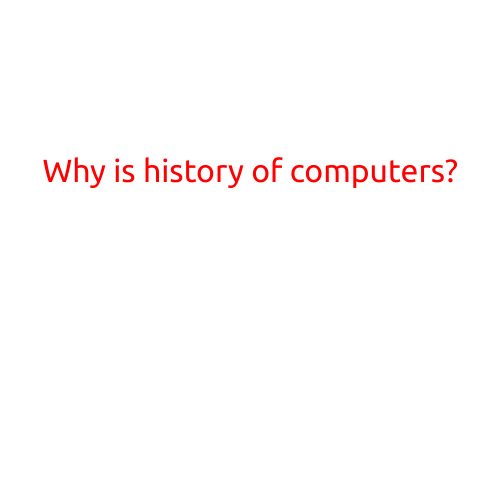
Why is the History of Computers Important?
Computers have become an integral part of our daily lives, from smartphones to laptops, and from gaming consoles to supercomputers. With the rapid advancements in technology, it’s easy to think that computers have been around forever. However, the history of computers dates back to the mid-19th century, and it’s a fascinating story of innovation, experimentation, and transformation.
The Importance of Understanding Computer History
Understanding the history of computers is crucial for several reasons:
Appreciation for Innovation: Knowing how computers evolved from humble beginnings to the powerful devices we use today provides a unique perspective on the innovations that have shaped our world.
Understanding Current Technology: The history of computers provides insight into the design decisions and trade-offs that influenced the development of modern technology. This knowledge helps users appreciate the functionality and limitations of contemporary computers.
Lessons for Future Developments: Studying the challenges, failures, and successes of past computer pioneers can inform and inspire future innovations, ensuring that we build upon existing knowledge rather than repeating past mistakes.
Cultural Significance: The history of computers reflects the cultural, social, and economic contexts in which they were developed, providing a window into the past and its significance for modern society.
Key Milestones in Computer History
Charles Babbage’s Analytical Engine (1837): Considered the first mechanical computer, Babbage’s design laid the foundation for modern computer architecture.
Konrad Zuse’s Z3 Computer (1941): The first fully automatic digital computer, the Z3 was developed in Germany and introduced electronic computation.
ENIAC (1946): The first general-purpose electronic computer, ENIAC was built in the United States and revolutionized computing with its electronic architecture.
Integrated Circuits (1958): The introduction of integrated circuits, which combined multiple components onto a single chip, reduced computer size, increased speed, and decreased cost.
Microprocessors (1971): The development of microprocessors, which placed a complete computer processing unit onto a single chip, transformed the industry and enabled the creation of personal computers.
Internet and World Wide Web (1980s-1990s): The widespread adoption of the internet and World Wide Web transformed the way people communicate, access information, and interact with each other.
Conclusion
The history of computers is a rich tapestry of innovation, experimentation, and transformation. Understanding this history not only provides insight into the evolution of modern technology but also informs our appreciation for the significance of computers in our daily lives. By exploring the past, we can better understand the present and shape the future of computing.
Whether you’re a computer enthusiast, a student, or simply curious about technology, understanding the history of computers is an essential part of appreciating the incredible journey that has brought us to where we are today.



